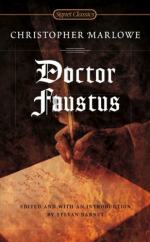|
This section contains 7,059 words (approx. 24 pages at 300 words per page) |

|
SOURCE: "New Wine and the Old Bottles: Doctor Faustus," in The Dramatist and the Received Idea: Studies in the Plays of Marlowe and Shakespeare, Cambridge University Press, 1968. Reprinted in Christopher Marlowe's "Doctor Faustus," edited by Harold Bloom, Chelsea House, 1988, pp. 27-45.
In the following excerpt, Sanders suggests that Faustus represents more than an aspiring Renaissance humanist; he argues that Marlowe meant his audience to "detect a serious moral weakness" in his actions.
Just as, in the treatment of the supernatural order, Marlowe seems to waver between a rather leaden-footed literalism and real imaginative insight, so in the characterisation of the sin for which Faustus is ultimately damned, he seems uncertain of his ground. At times it is seen homiletically as mere presumptuous pride, "a devilish exercise." At times (as it acquires a real dramatic weight and body) it is seen, less simply, as a legitimate aspiration somehow tainted...
|
This section contains 7,059 words (approx. 24 pages at 300 words per page) |

|


